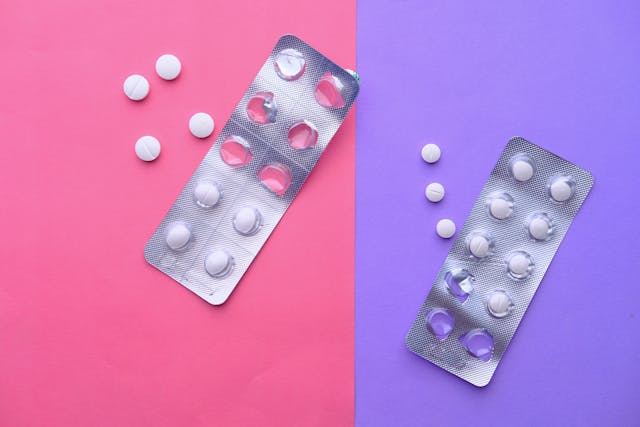PCOS self-care: Simple daily rituals for better health

Are you diagnosed with PCOS? Click to explore the baseline PCOS self-care strategies that will help you achieve balance and enhance your health from day to day.
PCOS is a common hormonal disorder that can’t be fully treated. Nevertheless, its symptoms can be significantly improved with the help of medical treatment and, no less important, PCOS self-care. Since this condition affects your body in many ways, there are several important self-care areas you need to cover, including:
- Nutrition
- Physical activity
- Mental health support
- Body and hair care
According to the World Health Organization, polycystic ovary syndrome (PCOS) has an effect on roughly 6-13% of women globally, with up to 70% of cases remaining undiagnosed. This hormonal condition has a deep effect on different organs and systems in your body, starting from your reproductive function to your body mass index, hair, and more. Of course, hormonal therapy and medical treatment are important for supporting your health with PCOS. Nevertheless, your lifestyle and daily habits also play a huge role in the treatment’s success.
So if you were diagnosed with this condition, here we will guide you through the main elements of effective PCOS self-care that should help you embrace your health.
{{button}}
Understanding PCOS and Its Challenges
Before we delve into the details of PCOS self-care, it’s important to get clear on the challenges typically facing women with this syndrome and the role of daily habits in addressing them.
As you should already know, PCOS is a chronic condition that affects your ovaries and usually implies the formation of multiple fluid-filled cysts on them. By affecting your ovaries, PCOS eventually leads to hormonal imbalances, increased androgen levels, and irregular menstrual cycle.
Although the exact cause of PCOS is still unclear, experts notice that its prevalence is often associated with hormonal imbalance and insulin resistance. It also often runs in families, which means that genetic factors may also affect its development.
Although experts can’t name the causes, the primary symptoms of PCOS are fairly known. They typically include:
- Irregular periods
- Fertility challenges
- Excessive hair growth (hirsutism)
- Hair thinning or loss
- Weight gain
- Oily skin and acne
Additionally, we should not neglect the emotional toll related to PCOS. While this condition frequently causes hormone-induced mood swings, being diagnosed with it can also put additional emotional pressure on you due to misconceptions and stigma that surround this disorder.
For the most part, these symptoms are caused by hormonal imbalances and related issues. And that’s where self-care steps in. Despite a common misconception, PCOS self-care is not an option or luxury but an absolute necessity for managing this condition. The thing is that daily habits and rituals can help you support both physical and emotional well-being, potentially, helping you address your symptoms.
5 Key Areas of PCOS Self-Care
Given the broad range of possible symptoms, effective PCOS self-care actually consists of several important areas. Let’s look into each area in detail to understand how to create the best daily routine that addresses your symptoms and helps you feel better.
1. Nutrition
Without any doubt, nutrition is the heart of your health. Since food serves as fuel for your body, what you eat directly impacts your wellness. In PCOS, proper nutrition is the first crucial management area because it can help you balance hormones, regulate insulin and blood sugar, manage weight, and address other inner processes, such as inflammation.
So what is the perfect PCOS self-care diet made of? The primary focus should be on the balance. It’s important that you consume proteins, fats, carbs, and other nutrients in sufficient amounts to create a healthy diet. To address blood sugar and insulin issues, you should embrace whole foods, lean proteins, and healthy fats, limiting processed foods, sugars, and refined carbs.
Note: When shaping your PCOS self-care diet, it’s important that you don’t get obsessed with restrictive diets. Although they can help you lose weight fast, they will likely cause more harm to your body in the future. So instead of restricting yourself, focus on eating healthily and choosing PCOS-friendly foods for every meal, especially for snacks, which often tend to be unhealthy.
2. Physical Activity
Physical activity and exercise are known to regulate essential hormones in your body. In particular, staying active can balance your levels of androgens, cortisol, and insulin, which is particularly important for women with PCOS. On top of that, regular exercise is known to boost endorphin levels and provide mood support, while also helping you maintain a healthy weight.
Given its positive effects on different bodily functions, physical activity should also be a part of your overall PCOS self-care. You can start by increasing your overall activity rate during the day. You can easily do it with the help of such low-impact exercise as walking a mile every day. To gain the most benefits though, it’s recommended to integrate strength training at least a few times a week. Once you integrate these tips and start finding joy in movement, your efforts will pay off in the form of better physical and mental health.
3. Supplementation
As you already know, a well-balanced PCOS self-care diet is one of the key management techniques required for this condition because it helps you fuel your body with all the nutrients it needs to stay healthy. Nevertheless, always adhering to a perfectly balanced diet is hard. And sometimes, you may still lack certain minerals, vitamins, antioxidants, and other nutrients. Luckily, you can make up for the things you lack with the right supplements.
Different PCOS supplements can help you treat insulin resistance, support hormonal balance, reduce inflammation, etc. Some of the most important nutrients that you can try include:
- Inositol
- Omega-3
- Vitamin D
- Magnesium
- Zinc
- Vitamins C
- Chromium
- Vitamin E
- Iron
- B vitamins
- Coenzyme Q10
Consider adding these supplements to your PCOS self-care routine. However, don’t hesitate to consult with a healthcare provider to make sure that you choose the most effective and beneficial options for you.
4. Mental Health Support
Chronic stress often leads to the overproduction of cortisol–the stress hormone. Although it’s mainly associated with your stress response, this hormone is actually responsible for regulating many other bodily functions, including inflammatory response, blood pressure, glucose metabolism, and others. Given its broad effect on your body, cortisol can clearly cause you a lot of harm. Studies find that its high levels (due to chronic stress) can possibly intensify the pathogenesis of PCOS and worsen your symptoms.
Given everything stated above, it becomes clear that stress management and overall mental health support are also among the key areas of PCOS self-care. Techniques like mindfulness and meditation can help you balance hormones and improve your mental well-being. So don't hesitate to integrate such techniques into your daily schedule.
Also, remember about the link between sleep and your mental wellness and hormones. Create a steady bedtime routine and try to get on a proper sleep schedule to gain added benefits.
5. Hair and Body Care
Apart from addressing your inner issues, it’s also crucial that you pay due attention to PCOS symptoms that reflect on your appearance. Things like moon face, dark skin patches, hair loss, and acne can greatly undermine your body image and confidence, which is why certain beauty rituals should also be present in your PCOS self-care.
Of course, the specific activities you need to implement depend on your specific symptoms. Nevertheless, here are a few tips on what you can try:
- To address the moon face, consider rethinking your diet and getting into a healthy weight. Also, embrace the importance of proper hydration and control your intake of salt.
- To get rid of dark skin patches, try topical treatments like hydroquinone, kojic acid, or retinoids. Also, try natural remedies like aloe vera, apple cider vinegar, and others.
- For hair loss, it’s important to implement overall healthy eating with a focus on vitamins that support hair strength and beauty. Additionally, it’s important to implement gentle hair care that prevents follicle damage.
- If you are dealing with excessive hair growth, you also need to implement a special hirsutism self-care, which typically consists of medical treatment, such as oral contraceptives, anti-androgens, and eflornithine cream, and self-help that involves hair removal. Apart from shaving, you can use depilatories, bleaching creams, waxing, and lasers in your hirsutism self-care routine
- To address acne, you can also change your diet and choose suitable topical treatments for acne together with your dermatologist.
FAQ
Why is PCOS self-care important?
PCOS is a chronic, hormonal condition that affects a variety of systems and functions in your body. Although medical intervention is important, changing your lifestyle and integrating the right PCOS self-care techniques can help you further improve your symptoms and support your physical and mental health.
What are the main aspects of self-care for PCOS women?
Given the broad diversity of symptoms and effects that PCOS has on your body, it’s crucial to take a holistic approach that addresses your hormones, weight, etc. The main areas of self-care include nutrition, physical activity, mental health support, and proper care for your body and hair (depending on specific symptoms).
What do I need to include in a PCOS self-care diet?
The best diet for PCOS is one that’s very balanced and provides you with all the essential elements that you need. Ideally, you should focus on whole foods, lean proteins, and healthy fats, adding fiber and vitamins from fruits and vegetables. Also, it’s important to restrict the intake of sugars, refined carbs, and processed foods.
Conclusion
If you’ve been diagnosed with PCOS, it can surely feel overwhelming. However, the good news is that you can improve your system and live healthily with this condition. To do this, you need to implement not only medical treatment but also change your lifestyle and daily habits.
Use the knowledge we shared with you here to create the right PCOS self-care routine that works for you!
{{pink-banner}}








.avif)
